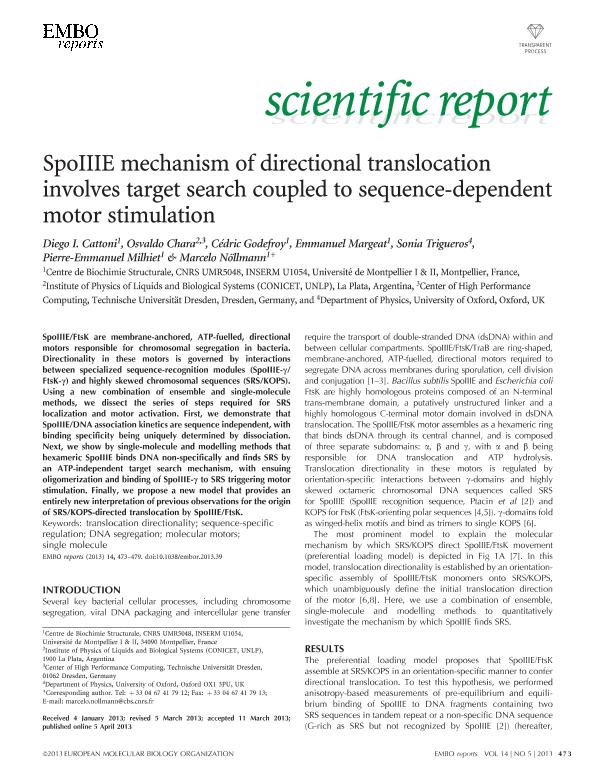Mostrar el registro sencillo del ítem
dc.contributor.author
Cattoni, Diego Ignacio

dc.contributor.author
Chara, Osvaldo

dc.contributor.author
Godefroy, Cédric
dc.contributor.author
Margeat, Emmanuel
dc.contributor.author
Trigueros, Sonia
dc.contributor.author
Milhiet, Pierre Emmanuel
dc.contributor.author
Nöllmann, Marcelo
dc.date.available
2017-09-05T17:02:19Z
dc.date.issued
2013-04
dc.identifier.citation
Cattoni, Diego Ignacio; Chara, Osvaldo; Godefroy, Cédric; Margeat, Emmanuel; Trigueros, Sonia; et al.; SpoIIIE mechanism of directional translocation involves target search coupled to sequence-dependent motor stimulation; Embo Press; Embo Reports; 14; 5; 4-2013; 473-479
dc.identifier.issn
1469-221X
dc.identifier.uri
http://hdl.handle.net/11336/23681
dc.description.abstract
SpoIIIE/FtsK are membrane‐anchored, ATP‐fuelled, directional motors responsible for chromosomal segregation in bacteria. Directionality in these motors is governed by interactions between specialized sequence‐recognition modules (SpoIIIE‐γ/FtsK‐γ) and highly skewed chromosomal sequences (SRS/KOPS). Using a new combination of ensemble and single‐molecule methods, we dissect the series of steps required for SRS localization and motor activation. First, we demonstrate that SpoIIIE/DNA association kinetics are sequence independent, with binding specificity being uniquely determined by dissociation. Next, we show by single‐molecule and modelling methods that hexameric SpoIIIE binds DNA non‐specifically and finds SRS by an ATP‐independent target search mechanism, with ensuing oligomerization and binding of SpoIIIE‐γ to SRS triggering motor stimulation. Finally, we propose a new model that provides an entirely new interpretation of previous observations for the origin of SRS/KOPS‐directed translocation by SpoIIIE/FtsK.
dc.format
application/pdf
dc.language.iso
eng
dc.publisher
Embo Press
dc.rights
info:eu-repo/semantics/openAccess
dc.rights.uri
https://creativecommons.org/licenses/by-nc-sa/2.5/ar/
dc.subject
Translocation Directionality
dc.subject
Sequence-Specific Regulation
dc.subject
Dna Segregation
dc.subject
Molecular Motors
dc.subject
Single Molecule
dc.subject.classification
Bioquímica y Biología Molecular

dc.subject.classification
Ciencias Biológicas

dc.subject.classification
CIENCIAS NATURALES Y EXACTAS

dc.title
SpoIIIE mechanism of directional translocation involves target search coupled to sequence-dependent motor stimulation
dc.type
info:eu-repo/semantics/article
dc.type
info:ar-repo/semantics/artículo
dc.type
info:eu-repo/semantics/publishedVersion
dc.date.updated
2017-09-01T17:44:25Z
dc.identifier.eissn
1469-3178
dc.journal.volume
14
dc.journal.number
5
dc.journal.pagination
473-479
dc.journal.pais
Reino Unido

dc.journal.ciudad
Londres
dc.description.fil
Fil: Cattoni, Diego Ignacio. Universite Montpellier II; Francia
dc.description.fil
Fil: Chara, Osvaldo. Consejo Nacional de Investigaciones Científicas y Técnicas. Centro Científico Tecnológico Conicet - La Plata. Instituto de Física de Líquidos y Sistemas Biológicos. Universidad Nacional de La Plata. Facultad de Ciencias Exactas. Instituto de Física de Líquidos y Sistemas Biológicos; Argentina. Universitat Dresden; Alemania
dc.description.fil
Fil: Godefroy, Cédric. Technische Universität Dresden; Francia
dc.description.fil
Fil: Margeat, Emmanuel. Universite Montpellier II; Francia
dc.description.fil
Fil: Trigueros, Sonia. University of Oxford; Reino Unido
dc.description.fil
Fil: Milhiet, Pierre Emmanuel. Universite Montpellier II; Francia
dc.description.fil
Fil: Nöllmann, Marcelo. Universite Montpellier II; Francia
dc.journal.title
Embo Reports

dc.relation.alternativeid
info:eu-repo/semantics/altIdentifier/doi/http://dx.doi.org/10.1038/embor.2013.39
dc.relation.alternativeid
info:eu-repo/semantics/altIdentifier/url/http://embor.embopress.org/content/14/5/473
Archivos asociados
